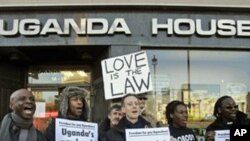A Ugandan woman who says she's a lesbian is facing deportation from Britain on Friday in the same week that a gay rights activist, David Kato, was murdered in her country.
Brenda Namigadde says she’s a lesbian and has sought asylum in Britain. But Britain’s Home Office says she’s “not homosexual” and so doesn’t have a valid claim.
She’s do to fly out of Britain Friday night but her lawyers told VOA they would be making a final bid for an injunction.
Peggy Layoo is founder of London-based Cardinal Solicitors, which is representing Namigadde.
She says the media attention given to Namigadde’s case makes the judge’s ruling on her sexuality irrelevant.
"With all the media attention and with the current situation in Uganda, she is likely going to attract adverse attention if she is sent back to Uganda now, regardless of her case," Layoo said.
Namigadde is being held at a detention center just outside of London. She moved to Britain in 2002 after, she says, being attacked in Uganda because of her sexuality.
Homosexual sex is against the law in Uganda. Earlier this week a gay rights activist, David Kato, was beaten to death at his home. Police say he was attacked with a hammer. Ugandan police say they don’t believe Kato’s sexuality was the motive but many rights activists disagree.
Layoo says Kato’s murder has made Namigadde even more scared to return to Uganda. Namigadde, she says, has no one to take care of her there.
"She hasn't got the resources to pay for personal protection, obviously, she's going to have to use public transport, she's going to be ridiculed, she's going to be humiliated, and she's not going to be safe wherever she goes from now on," she added.
Juris Lavrikovs is from the International Lesbian and Gay Association. He says there is no formula in Europe for how to deal with cases like Namigadde’s - but one needs to be put in place.
"This is unfortunately yet the area which is not well regulated or documented and this is something we're working quite a lot with the European institutions to make sure that there is a framework within the European Union and the Council of Europe with cases like this," said Lavrikovs.
Antonio Guterres, the United Nations High Commissioner for refugees, has said that people facing persecution in Uganda because of their sexual orientation should be given refugee status.
Lavrikovs says European countries need to set the bar in order to improve the rights of lesbian, gay, bisexual, transgender and intersex people around the world.
"Europe has been always one of the leaders in terms of the Human Rights Protection, including also for LGBTI people,” Lavrikovs added. “And I think it's the responsibility of Europe as a whole and the European institutions to use all the available tools in their powers when dealing with those countries like Uganda."
Gay marriage has been legalized in a number of European countries over the past decade, including the Netherlands, Belgium, and Spain. South Africa legalized gay marriage in 2006, the first African country to do so.
Ugandan Woman Claiming to be Gay Faces Deportation from Britain




